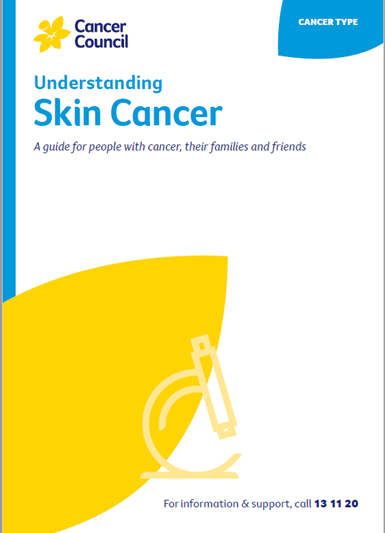- Home
- Skin cancer
- Treatment
Skin cancer treatment
Non-melanoma skin cancer is treated in different ways. The treatment recommended by your doctors will depend on:
- the type, size and location of the cancer
- your general health
- any medicines you are taking (these may increase the risk of bleeding after surgery or delay healing)
- whether the cancer has spread to other parts of your body.
If an excision biopsy removed all the cancer, you may not need any further treatment.
Learn more about:
- Making treatment decisions
- Surgery
- Curettage and electrodesiccation
- Cryotherapy
- Topical treatments
- Photodynamic therapy
- Radiation therapy
- Treating sunspots and superficial skin cancer
- Hard to treat and advanced skin cancer
Treatment of sunspots and superficial skin cancer
Many of the treatments described in this section are used for sunspots as well as skin cancers. Some sunspots may need treatment if they are causing symptoms or to prevent them becoming cancers.
Skin cancer that affects cells only on the surface of the skin’s top layer is called superficial. Treatment options for superficial basal cell carcinoma (BCC) and squamous cell carcinoma (SCC) in situ (Bowen’s disease) include curettage and electrodesiccation (also known as cautery), freezing, topical creams and photodynamic therapy.
Surgery is not always used for superficial BCC and SCC in situ. It may be used if the diagnosis is uncertain or if the area of abnormal tissue does not respond to non-surgical treatments.
Hard to treat and advanced skin cancer
A very small number of SCCs and even fewer BCCs spread to lymph nodes or other areas of the body. To work out if the skin cancer has spread, your doctor will feel nearby lymph nodes and may recommend a biopsy, imaging scans or other tests.
You may be referred to a cancer specialist called a medical oncologist. Your doctor or medical oncologist will explain your treatment options, which may include surgery, radiation therapy or drug therapies such as immunotherapy, targeted therapy or chemotherapy.
Drug therapies such as immunotherapy may be used before or after surgery for some cancers, or used instead of surgery or radiation therapy for some people.
→ READ MORE: Making treatment decisions
Podcast: Making Treatment Decisions
Listen to more episodes from our podcast for people affected by cancer
A/Prof Victoria Mar, Director, Victorian Melanoma Service, Alfred Hospital and Monash University, VIC; Tracey Bilson, Consumer; Raelene Buchan, Consumer; Alison Button-Sloan, Consumer; Dr Margaret Chua, Radiation Oncologist, and the Skin Radiation Oncology team, Peter MacCallum Cancer Centre, VIC; Prof Anne Cust, Deputy Director, The Daffodil Centre, The University of Sydney and Cancer Council NSW, Chair, National Skin Cancer Committee, Cancer Council, and faculty member, Melanoma Institute Australia; A/Prof Paul Fishburn, Skin Cancer Doctor, Norwest Skin Cancer Centre, NSW and Faculty of Medicine, University of Queensland; Danielle Goss, Melanoma Clinical Nurse Specialist, Amie St Clair Melanoma (part of Melanoma Institute Australia), Wagga Wagga, NSW; Louise Pellerade, 13 11 20 Consultant, Cancer Council WA: Dr Shireen Sidhu, Head of Dermatology, The Royal Adelaide Hospital, SA; Dr Amelia Smit, Research Fellow – Melanoma and Skin Cancer, The Daffodil Centre, The University of Sydney and Cancer Council NSW; Dr Tony Tonks, Plastic and Reconstructive Surgeon, Canberra Plastic Surgery, ACT.
View the Cancer Council NSW editorial policy.
View all publications or call 13 11 20 for free printed copies.
